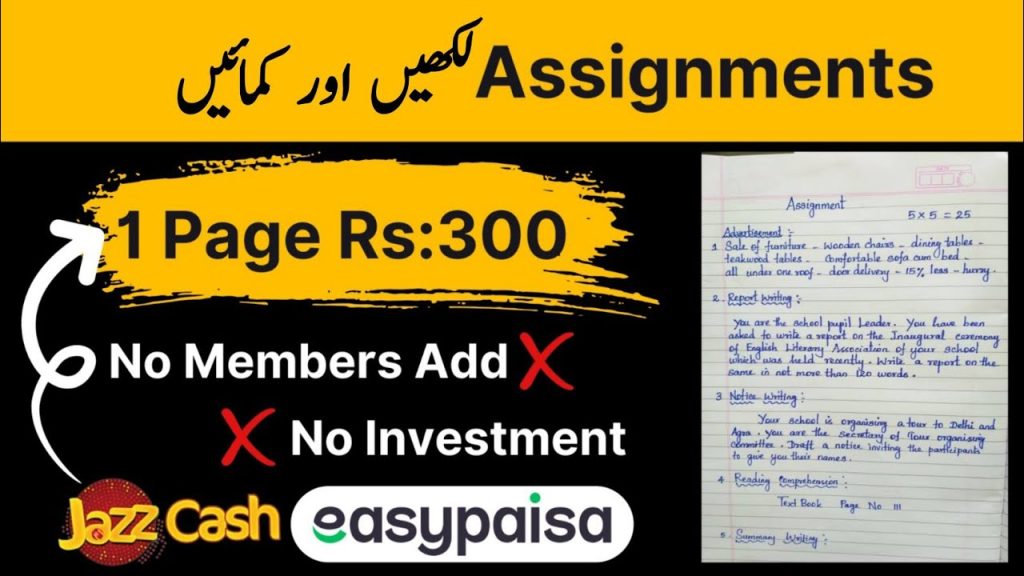In the ever-evolving landscape of education and work, students are increasingly turning to online assignment work as a way to supplement their income, build experience, and even enhance their academic skills. As online learning continues to reshape traditional education, a parallel rise in freelance academic work has emerged. Whether it’s helping clients with essays, reports, or research, many students now find themselves engaged in assignment work for clients and companies. This trend raises both opportunities and challenges—benefiting students financially while simultaneously posing risks to academic integrity and work-life balance.
In this article, we’ll delve into why students are opting for online assignment work, the potential advantages and disadvantages, and how to approach this growing sector in a responsible and productive manner.
Why Students Are Turning to Online Assignment Work
The digital revolution has fundamentally changed how students learn, connect, and work. Online platforms like Fiverr, Upwork, and Freelancer have made it easier than ever for students to offer their academic skills in exchange for money. In addition to these platforms, there are also specialized websites where students can assist others with assignments, coursework, and tutoring services.

The driving force behind this shift is multifaceted:
- Financial Necessity
For many students, the cost of higher education is a significant burden. With tuition fees, books, and living expenses, it’s no surprise that students are looking for ways to generate income. Freelancing in the field of academic work allows them to utilize their knowledge in exchange for cash, without the need for a traditional job that might require fixed hours. - Flexible Work Schedule
Unlike conventional part-time jobs, online assignment work offers students the flexibility to set their own schedules. Many students struggle to balance academic responsibilities with work commitments. Freelancing provides a way to work when they are available, meaning that they can earn money without compromising their study time or personal life. - Skill Development
Students are not only making money, but they’re also honing valuable skills. The process of completing assignments for clients helps develop writing, research, and communication skills. These are transferable skills that can benefit students in their academic careers and future jobs. Moreover, gaining experience with freelance work provides insight into the demands of the professional world. - Building a Portfolio
For students aiming to build careers in fields such as content writing, research, or consulting, freelancing in academic work can serve as an entry point. They can compile a portfolio of completed assignments, which serves as proof of competence when applying for internships or full-time roles after graduation.
The Potential Benefits of Freelancing in Academic Work
1. Extra Income to Offset Costs
One of the primary reasons students turn to online assignment work is the potential for extra income. As a student, your budget can often be stretched thin, and securing additional funding through freelancing can be a practical solution. Many students find that the extra money allows them to cover costs that scholarships, loans, or part-time jobs do not, such as textbooks, rent, or social activities.
2. Real-World Experience
Freelancing through online assignment work offers students a chance to engage with real-world problems and deadlines. Students often receive assignments from clients who have specific demands, which helps develop problem-solving and adaptability. This experience is crucial in preparing students for post-graduation careers where meeting deadlines and working with clients are everyday tasks.
3. Time Management and Discipline
While juggling academic work and freelancing can be demanding, it forces students to improve their time management skills. Students learn to prioritize tasks, set clear boundaries, and ensure their work is done on time. These are skills that will be valuable long after graduation when they begin their careers.
4. Networking Opportunities
Freelancing doesn’t just improve academic and professional skills; it can also help students expand their professional network. Working with clients from different industries allows students to make connections that might later serve them in their professional lives. In some cases, a freelance project might even lead to a full-time job or internship opportunity.
Challenges Students Face with Online Assignment Work
While the benefits of online assignment work are clear, there are several challenges that students should be aware of before diving into this type of freelancing.
1. Balancing Academics and Work
The main challenge that most students face when undertaking online assignment work is managing their time. The temptation to take on too many freelance projects can lead to burnout, as students struggle to balance coursework, part-time work, and social commitments. Students who don’t manage their schedules well may find themselves sacrificing their grades to meet freelance deadlines.
One of the keys to success in this area is setting clear boundaries. Freelancers should only accept assignments they can realistically complete without jeopardizing their academic work. Prioritizing the most important tasks and learning to say no when necessary is essential for a healthy balance.
2. Risk of Ethical Dilemmas
One of the most significant risks associated with online assignment work is the potential for academic dishonesty. While many freelance services focus on helping clients improve their assignments through editing or research, some students might be tempted to do the work entirely for the client. This practice—known as ghostwriting—can lead to severe consequences for both the freelancer and the student who submits the work.
To avoid these ethical pitfalls, students should avoid providing completed assignments on behalf of others and focus on offering legitimate services such as tutoring, editing, or brainstorming ideas. The goal should always be to help others improve their work rather than doing it for them.
3. Quality Control and Client Expectations
When students take on freelance academic work, they may be asked to write on topics outside their area of expertise. This can result in lower-quality work, and clients may have high expectations that might be difficult to meet, especially for those just starting out in the freelance space. Navigating these expectations can be tricky, and failing to meet them can harm a student’s reputation.
To address this, students should be upfront about their areas of expertise and only accept assignments that match their skills. If a client requests work in an unfamiliar subject, it’s better to politely decline than risk producing poor-quality work.
4. Exploitation by Clients or Companies
Another challenge is the risk of being underpaid or exploited by clients. Many students enter the freelance market with little to no knowledge of pricing or industry standards. As a result, some clients may take advantage of students by offering low pay for complex tasks. While it can be tempting to accept low-paying work for the sake of gaining experience, students should know their worth and ensure that they are compensated fairly for their time and skills.
5. Legal and Institutional Concerns
In some cases, the line between freelancing and academic dishonesty can be unclear. Some universities may have policies that prohibit students from engaging in freelance work related to assignments. Students should be familiar with their institution’s guidelines and make sure that their freelance activities don’t violate any academic integrity policies.
How Students Can Succeed in Online Assignment Work
To navigate the complexities of online assignment work successfully, students should keep a few key strategies in mind:
- Set Clear Guidelines
Establish clear boundaries for the type of work you will do. Ensure that you are not crossing ethical lines, such as completing assignments for others. Instead, offer services like research assistance, brainstorming, and editing, which can provide value without violating academic standards. - Manage Time Effectively
Use a planner or digital calendar to keep track of deadlines. Prioritize academic assignments and ensure that freelancing work doesn’t interfere with your studies. A well-structured schedule will help you manage both academic and freelance responsibilities effectively. - Charge Fair Rates
Understand the value of your work. While it’s tempting to accept low-paying jobs to get your foot in the door, it’s important to charge rates that reflect the quality of work you provide and your level of expertise. - Maintain Professionalism
Treat your freelance work as a professional job. Communicate clearly with clients, meet deadlines, and provide high-quality work. A strong reputation will lead to repeat clients and higher-paying projects. - Learn Continuously
Freelancing provides an opportunity to learn new skills, whether it’s improving your writing, learning a new subject, or mastering time management. Continuously improving your skills will make you more valuable to clients and increase your chances of success.
Conclusion
Online assignment work offers students an attractive way to earn money, gain real-world experience, and refine their academic skills. However, it also comes with significant challenges, including time management issues, ethical dilemmas, and the risk of exploitation.
Join Now
By approaching online assignment work with care, professionalism, and a commitment to ethical practices, students can navigate the freelance world successfully, all while maintaining their academic integrity. The key to thriving in this sector lies in balancing academic responsibilities with freelance commitments and using the experience as an opportunity to build valuable skills for the future.



